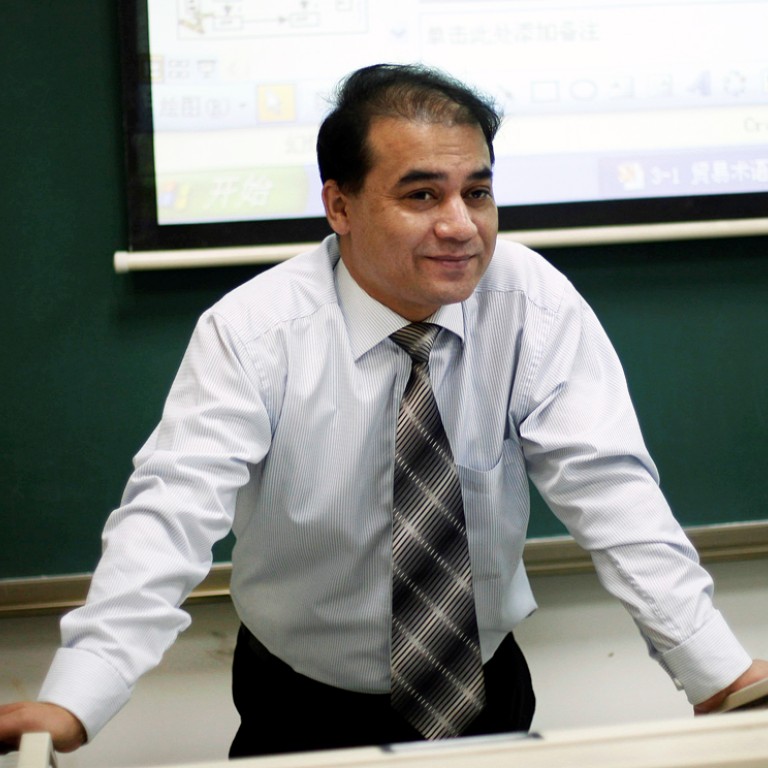
Video | Ilham Tohti's 'separatist' videos released by Chinese state media after controversial conviction
Details of Ilham Tohti’s alleged separatist speeches to his students were released by mainland media on Wednesday in an attempt to justify his harsh trial sentencing.
Details of Ilham Tohti’s alleged separatist speeches to his students were released by mainland media on Wednesday in an attempt to justify his harsh trial sentencing, which triggered an outcry from international communities and rights groups.
The official Xinhua News Agency published court records of the two-day trial at the Xinjiang court, including excerpts of economics professor Tohti’s lectures in which he allegedly goaded students into “fighting the government”.
”Don’t [view] violent resistance as terrorist activities," Xinhua quoted Tohti as saying in one classroom lecture. "The government is like guizi [Japanese soldiers during the Sino-Japan war]. You can fight against it by any means."

”I admire those who use violence to fight against violence,” Xinhua quoted Tohti, who used to teach at Minzu University in Beijing, as saying in the video. “Moderate people like me could also be forced to kill in order to resist [authority].”
The defence lawyer told the court that Tohti had always been against terrorism and that none of his students had become extremists after taking his class, Xinhua said.
WATCH: Excerpt of classroom videos presented at Tohti's trial
Legal experts and lawyers have questioned why the prosecutors charged Tohti with separatism, when in fact the speeches and articles they paraded in court only constituted inciting to separatism, a lesser charge.
Western leaders and experts responded to the sentence saying China was silencing a “moderate voice” advocating for Uygur rights. Rights groups say the mainly Muslim ethnic group, who populate the far Western region of Xinjiang, have faced discrimination and restrictions on their religion and culture under Chinese rule.
US Secretary of State John Kerry issued a statement on Tuesday urging mainland authorities to release Tohti. “This harsh sentence appears to be retribution for Professor Tohti’s peaceful efforts to promote human rights for China’s ethnic Uygur citizens,” he said.
In response, state media on Wednesday also released selections of articles published on a Chinese-language website that Tohti managed, Uighur Online, which state media said “provocate ethnic hatred” and promote Xinjiang’s independence.
Xinhua also said Tohti published a fabricated survey on Uygur-Han relations supposedly showing that 12.3 per cent of Uygur respondents favoured Xinjiang independence as “the only way out”.
Tohti defended himself in court, saying he was not the author of the survey report.
One of Tohti’s lawyers, Liu Xiaoyuan, questioned if the Xinhua report – released before the verdict would take effect – would prejudice the court, especially considering that Tohti planned to appeal his conviction.
Verdicts in criminal cases take effect 10 days after conviction, if there is no appeal.
READ MORE: Ilham Tohti to appeal conviction, lawyers say
Liu said on Twitter that he had filed complaints to the Intermediate People’s Court of Urumqi, and a staff member promised to pass the complaint to court officials.
Liu, in a message on his Weibo account, also called on the court to release all footage of the trial for transparency, saying the court did not follow procedures and did not ask witnesses to attend the trial.
Meanwhile, the Foreign Ministry spokesperson said at a daily press briefing on Wednesday that China is opposed to other countries interfering with the country’s judiciary independence and domestic affairs, in response to the international criticism over Tohti’ life sentence.
